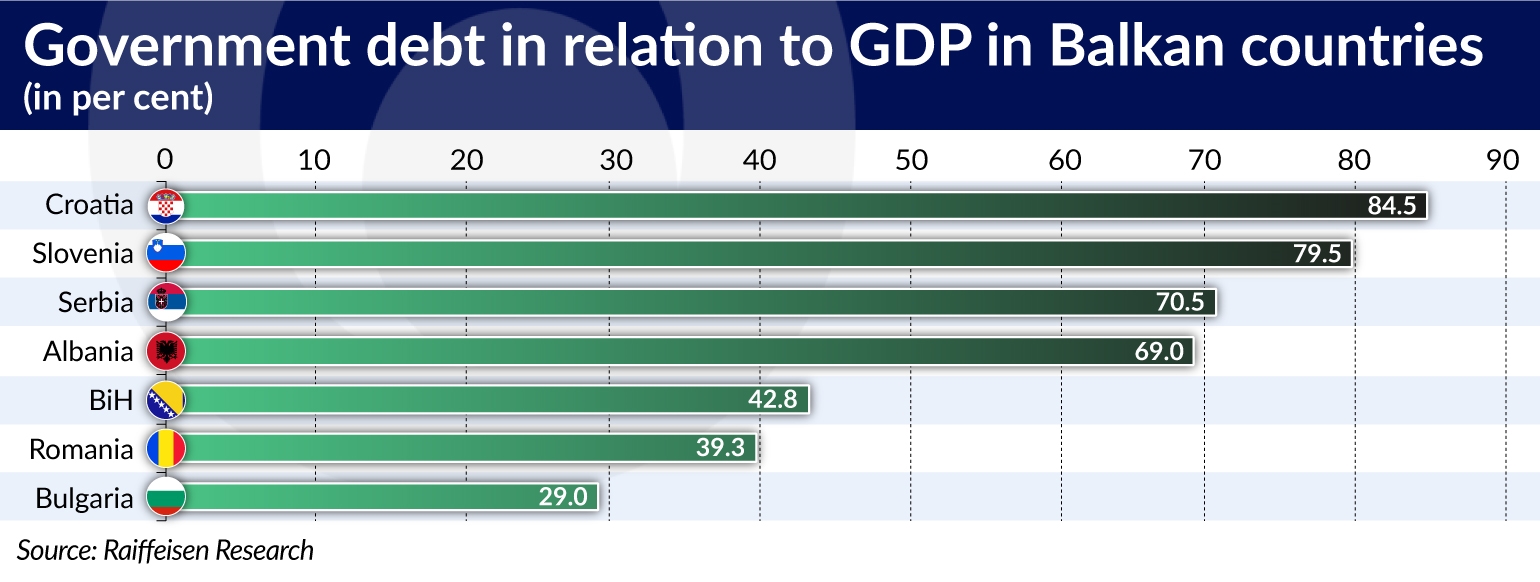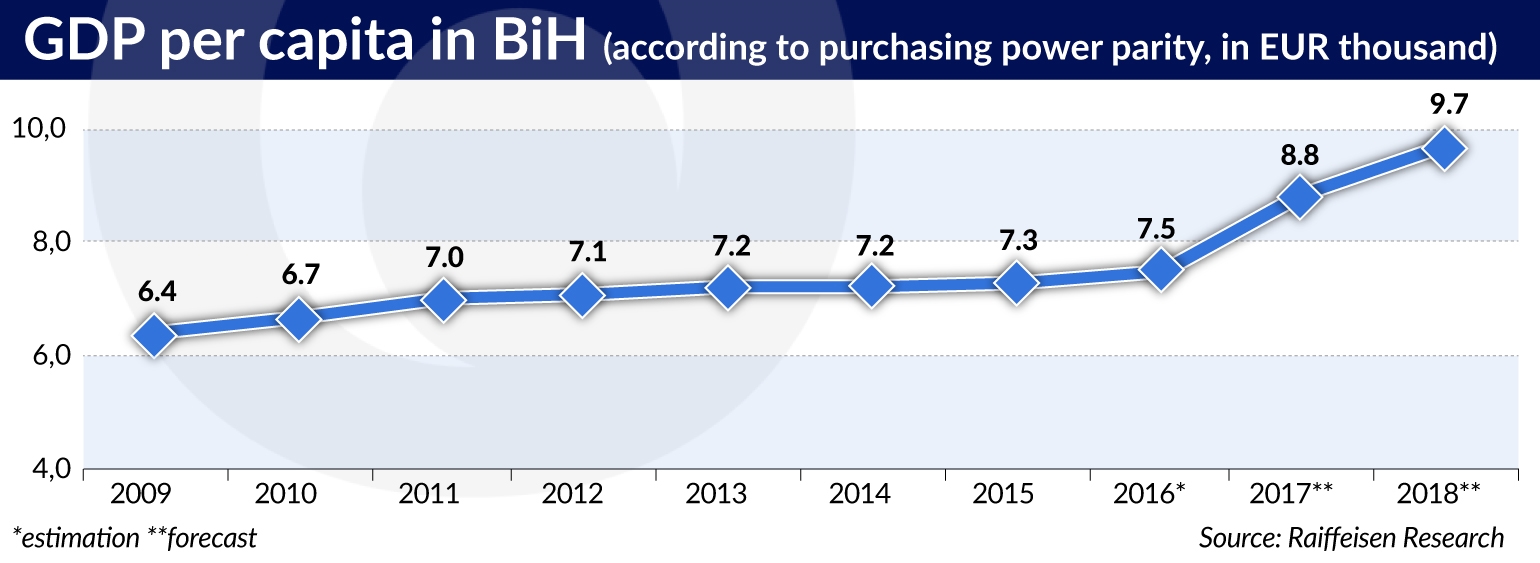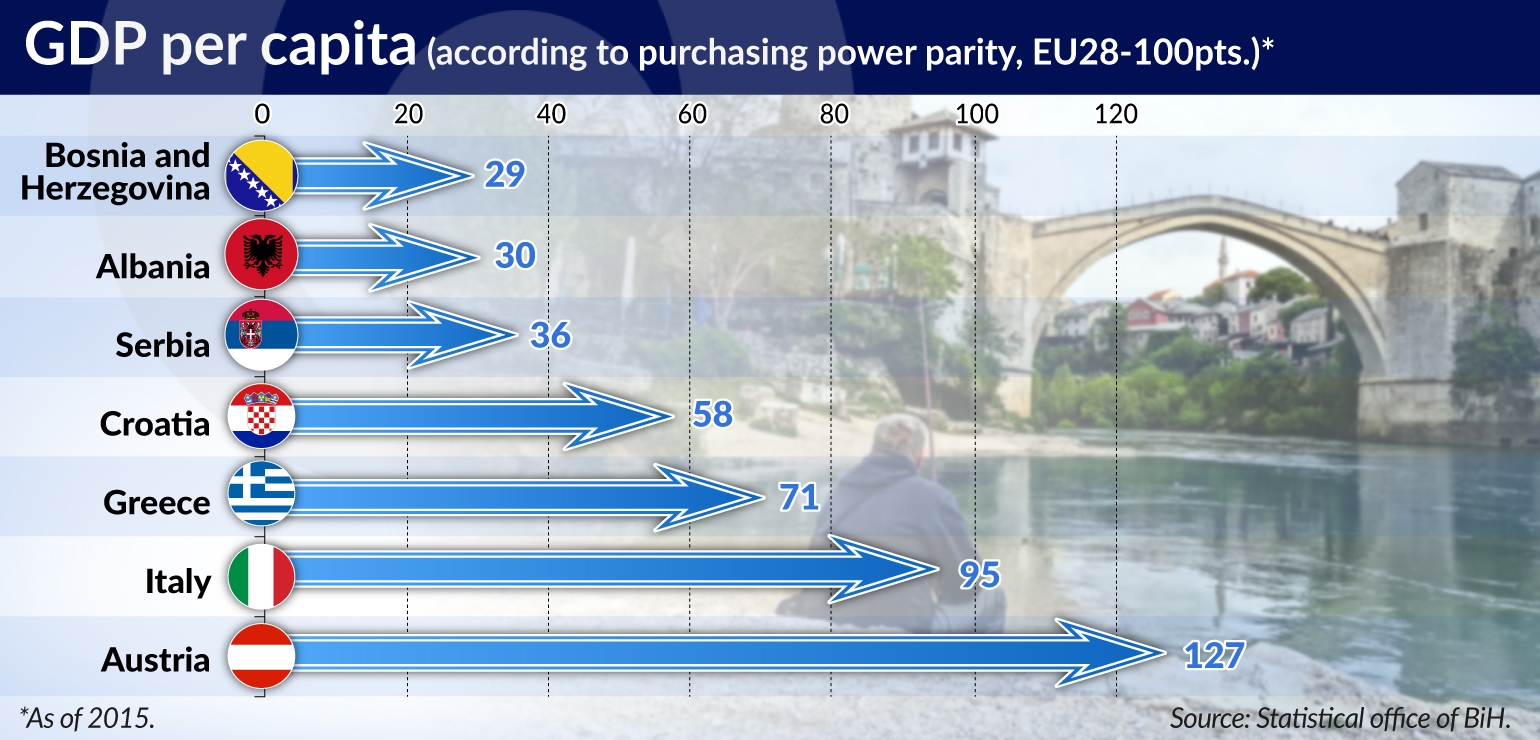In 2016, it seemed that Bosnia and Herzegovina (BiH) – a federation established after the Balkan War of the early 1990s under the Dayton Peace System (1995) – was getting out of the woods. In February 2016, the country applied for membership of the European Union, and in September its application was accepted. This way, Bosnia became a country associated with the EU (but not yet a candidate).
The problem is that we now have the year 2017. „A new year, a new political crisis in Bosnia” – this is how the Raiffeisen Research report from March 2017 (prepared by the experts of Raiffeisen Bank BiH) began. The program of financing the needs of BiH with money from the International Monetary Fund (IMF), and perhaps even its entry into the EU, has been questioned.
The demons of the war woke up…
In the first quarter of this year, the demons of war began to wreak havoc in Bosnia once again. And they paralyzed the activities of BiH’s governing bodies. But first things first. A proper introduction is necessary.
BiH’s political system was designed in Dayton. It consists of BiH Federation (FBiH), the Republika Sprska (RS) and Brčko District. Executive power is the BiH Presidium, which consists of a Bosnian and a Croat elected in the Federation and a Serb elected in Republika Sprska. The legislative power is the Parliamentary Assembly composed of the House of Representatives and the House of Nations.
In February, the Presidium’s work was paralyzed, and a fervent debate started in the Parliament. The representatives of the people living in Bosnia were divided by the decision of the BiH Federation to appeal against the judgment of the International Court of Justice in the Hague in February 2007 concerning, inter alia, the Srebrenica massacres. Federation representatives stated that they cannot accept the fact that in the justification of the verdict the Court de facto released the Republic of Serbia from the liability for the massacre.
„The appeal against the judgment of the Tribunal caused political tension in all BiH authorities (…) We expect the continuation of Bosnian economic reforms, but the pace of these reforms can be significantly slowed down as a result of friction and lack of cooperation between the authorities,” said Raiffeisen Research experts in the report.
In this context creating a Balkan’s common market, for which Johannes Hahn, the EU Commissioner for Enlargement and European Neighborhood Policy called, seems impossible. According to Hahn, the Balkan states could greatly benefit from closer cooperation, and as a result, as many as 80,000 work places could be created.
… and stonewalled the Bosnian economy
In mid-April, it was already known that Raiffeisen Research analysts were right: because of political quarrels, the Bosnian Parliament was unable to adopt on time all the changes required by IMF (i.e. the law regarding financial institutions and excise duty regulations). Since the package was not adopted, the fund blocked the aid in the amount of EUR563.3m, which was supposed to be sent under the agreement of September 2016. Admittedly, the Parliament’s Upper House, at a special meeting held on April 7th, finally adopted the acts, but by April 19th they were still not adopted by the Lower Chamber, which at the meeting on April 20th sent the work on these laws to an „express path”.
So far the changes required by the EU and IMF are not passed, and BiH may lose one of the most important sources of external financing. „Sarajevo Times” portal began to seriously wonder whether Bosnia is at risk of the Greek scenario.
IMF lowered its forecast of GDP growth of Bosnia in 2017 from 3.2 per cent to 3 per cent. The Fund believes that in 2018 the BiH economy will grow by 3.5 per cent, and in 2022 by as much as 4 per cent. Bosnia is not a heavily indebted country (the debt to GDP ratio is around 43 per cent, while the Eurozone average is 90 per cent) but it is largely dependent on funds from international institutions.
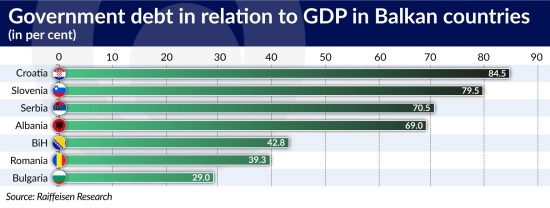
“We are not dependent on external transfers, but we are not capable of self-financing. BiH would have to pay a lot of money to encourage investors to buy long-term government bonds, so it is more profitable to open credit lines in institutions such as the IMF. This is typical of countries in the region. Even Serbia and Croatia cannot completely finance their debt,” explains Ivon Zametic, an analyst at Raiffeisen Bank Bosnia and Herzegovina.
Despite relatively low debt and a stable banking system – led by an independent and renowned central bank that keeps inflation in check – BiH is not well rated by credit rating agencies. S&P has maintained its B rating with a stable outlook (similar to Cameroon and Jamaica). Moody’s assigned a B3 rating with a stable outlook (same as Egypt and Moldova).
BiH is also not very well appreciated by its citizens. In 2015, as many as 1.65 million people born in BiH lived outside the country – 30 per cent of the nation. In this respect, BiH ranked the first in the world, ahead of Albania and Jamaica (according to the UN Pew Research Centre).
Wasted 20 years
Meanwhile, Bosnia is faced with serious challenges, it has to introduce reforms, and needs funding. Many international institutions point out the overgrown public sector (there are still many public enterprises that need to be privatized) and there is an urgency to regulate the energy market.
We can say that Bosnia has wasted its last 20 years. In the World Bank’s Doing Business ranking the country has gone down to take the worst place among the Old Continent countries – it is on the 81st position, between Ukraine and Vietnam. The Administration of Justice in BiH is extremely slow – businesses are waiting for court rulings in commercial law cases on average for 702 days, which is six times longer than in other European countries. When looking at GDP per capita weighted by purchasing power parity, we will see that Bosnia was overtaken by Albania and Serbia – countries which in the mid-90s were in a worse economic situation.
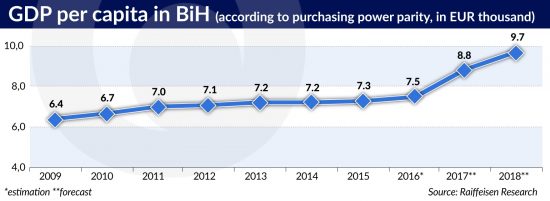
“It is true that our neighbors have grown stronger than us in the recent years. It is no secret that the process of making political decisions in our country is complicated. This slows down the economic development and the use of funds. The development of exports that we have recently experienced has mainly been driven by private companies and active citizens. Bosnia’s economic condition would look a lot better if not for a complicated political situation,” says Ivona Zametica.
The Raiffeisen Bank analyst points out that the extent to which the problems of the political sphere affect the economy is best seen when looking at the data on the inflow of foreign direct investment. By 2015, its value reached 1.4 per cent of GDP, while in 2014 it was 2.6 per cent of GDP.
Two financial markets, two stock exchanges, two legal systems
When looking at the financial market the divisions are obvious. Such a small country as BiH has two stock exchanges (in Sarajevo and Banja Luca), two separate securities deposits and two separate systems of financial institutions supervision, namely de facto two separate financial markets.
“Bosnia attracts fewer foreign investors than it could, if it were a politically stable country. The fact that we have one of the lowest CIT rates in the world (10 per cent) does not change much. Entrepreneurs look at the biger picture. Low taxes are not everything. It must be said frankly that foreign investors still come up against things in Bosnia that discourage them, such as the instability of the law, unclear regulations and corruption,” points out Zametica.
Also, the ownership structure of the largest companies, where an important player is still the state, is the result of the defective political system.
“The existence of two distinct political entities, the Federation and the Republika Sprska makes privatization in BiH complicated. There are also two parallel legal and regulatory regimes. This lack of transparency and stability means that the process does not go quickly and smoothly,” says Fikret Causevic, professor of economics at the University of Sarajevo.
BiH may become an important energy supplier in the region
The Raiffeisen Bank analysts are convinced that in the last months there have been many positive signals from the Bosnian economy. First of all, the export looks very good.
“The service sector is growing. Its growth is faster than GDP growth. Apart from that, Bosnia produces more and more final goods such as machines, car parts, furniture and electricity, and that of course bodes well for the future,”says Ivona Zametica. She adds that the energy sector is one of the most promising branches of the Bosnian economy. “Recently, a number of power plants, including those using renewable sources of energy, have been built in BiH, the export of electricity is growing.”
The riches of Bosnia, which can allow it to develop large-scale energy production, were also noted by experts from the US Department of State in their report entitled „Bosnia and Herzegovina – Investment Climate Statement 2016”.
Experts from the Vienna Institute for International Economic Studies (wiiw) also noted the economic recovery in Bosnia. “Growth momentum improved in the second half of 2016, and this should continue in 2017, as a strengthening labor market and rising wages boost private consumption. Industrial output should also post fairly strong growth, helping to underpin an improvement in exports, although this will continue to be held back somewhat by poor infrastructure,” wiiw wrote in its report.
The future problem with infrastructure should be solved at least in part. The construction of the A1 motorway is under way, which will make it possible to quickly drive from the Croatian coast through Mostar and Sarajevo to Hungary.
BiH’s problem is the concentration of trade on few countries. Bosnia’s main trading partners – both in terms of exports and imports – are Austria, Germany, Italy, Slovenia and Croatia. Ivona Zametica admits that Bosnia would use geographic diversification in this respect, and its potential big trading partners include, among others, Turkey and Russia.
Unemployment is high, but only on paper
One of the characteristics of BiH’s economy is the large shadow economy. Its size is estimated at about 25 per cent of annual GDP. Bosnia has the highest unemployment rate in Europe reaching 41 per cent, which is also one of the highest unemployment rates in the world. “The unemployment rate is in fact much lower, because a lot of people are working in agriculture and services,” points out Zametica.
In services, namely provision of services for tourists who massively visit the country, among others, is the sanctuary of Medjugorje. According to the Raiffeisen Bank analyst, tourism is one of the branches of the economy, which is developing dynamically and has a great potential. If only Bosnia was not often victim of disasters which can scare away the tourists.
Earthquakes and floods
In May 2014, Bosnia suffered from a large flood that directly affected approx. 1 million people (the death toll was 25). According to the Global Facility for Disaster Reduction and Recovery (GFDRR) reported losses were estimated at USD0.5bn, or about 3.6 per cent of GDP. The previous flood (much smaller) struck the country in December 2010 (the death toll was 3).
Bosnia is also hit by earthquakes from time to time. The last one was in 1969, destroying Banja Luca and the surrounding area – 14 people were killed, and the losses amounted to about USD300m.
“If a similar earthquake hit the region today, it would kill about 400 people, and the losses could reach as much as USD4bn,” GFDRR experts estimate.
So, it can be said that Bosnia is a bit of an unlucky country: not only it’s inhabited by feuding nations that cannot create a stable political community, but also continues to be plagued by natural disasters. Bosnians, however, cannot sit on their hands. They should restrain their emotions and make changes in the economic, legal and political system of the country if they really want economic growth, foreign investment and EU membership. They must also remember that by the end of 2017 they should conscientiously complete the questionnaire received from the EU – it contains 3 thousand questions regarding the economic and political sphere – if they want to become a candidate for the Community.
“BiH will submit answers to EC’s Questionnaire in September or October if there are no political obstructions as those seen in the past four months,” Chairman of the Council of Ministers of BiH Denis Zvizdic said. Zvizdic also reassured that the coordination mechanism on EU matters is fully operational. He added that out of the 36 formed working groups 33 have had meetings and are actively working.
Even assuming that reforms in Bosnia will be running smoothly, we probably won’t see Bosnia in the European Union any time soon. The history of accession of the 13 countries that have so far joined the EU shows that the average waiting time to join the EU is 9.6 years after submitting the application. This means that BiH should join the EU around 2026.
